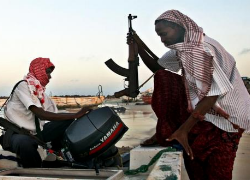
News of global piracy has faded into the background of the international arena for some, but many countries are still dealing with it. While an international maritime anti-fraud agency has reported a 54 percent reduction in piracy attacks off the Somali coast, recent attacks show that piracy is still a major global problem. The same anti-fraud agency that reported the reduction, the International Maritime Bureau (IMB), also reported that piracy continues to cost global trade up to 12 billion dollars annually. Furthermore, the threat has increased in areas that once had relatively low levels of pirate attacks.
Attacks have occurred as recently as this past week. On Monday, October 15, Nigerian pirates attacked a French cargo vessel bound for the Nigerian port of Onne. While the cargo vessel safely docked at the port, authorities learned that the pirates had actually kidnapped six Russians and one Estonian. Nigerian Special Forces are tirelessly working with Russia and Estonia to locate the kidnapped crewmembers, although their whereabouts remain unknown.
This latest attack near the Niger Delta is an example of an alarming trend of increased piracy in West Africa. While there were only 25 incidents of piracy reported in the region last year, 32 incidents of piracy had already been reported by this past July. There has also been an increased level of violence along with the increased number of attacks. Guns were reported in at least 20 of the 32 incidents, and two have been killed as a result of these attacks. Many of these attacks are also occurring at greater distances from the coast, suggesting the use of more sophisticated vessels in perpetrating these attacks.
Somali piracy also remains a problem. According to Pottengal Mukundan, Director of the IMB, “Somali pirate attacks cover a vast area, from the Southern Red Sea, Gulf of Aden, and Gulf of Oman to the Arabian Sea and Somali Basin, threatening all shipping routes in the northwest Indian Ocean.” Also, as of June 2012, Somali pirates still held a significant number of crewmembers and vessels hostage. Although, as mentioned above, there has been a decline in the number of Somali pirate attacks from last year, the level of violence has not decreased. In March, for example, Somali pirates captured a Taiwanese fishing boat in the waters of the Seychelles Islands and killed the Taiwanese captain two days later. These Somali pirates are still holding the crewmembers of this vessel hostage.
Despite the increase in violence and attacks in certain regions, there has been much progress in the global effort against piracy. More nations are beginning to prosecute pirates, and military and naval efforts against pirates have significantly increased. Recently, a Kenyan Court of Appeals overturned a decision precluding the trial of Somali pirates in Kenya. A judge had previously ruled that Kenya lacked jurisdiction; however, the Court ruled that every State has an interest to try crimes such as piracy. Germany also convicted ten Somali pirates on October 19, after an almost two-year long trial, for seizing a freighter. Furthermore, efforts to locate and stop piracy have increased beyond NATO and EU-led efforts, with countries such as the United States and France increasing enforcement and surveillance.
Bailey Woods is a 2L and a staff editor on the Denver Journal of International Law and Policy


